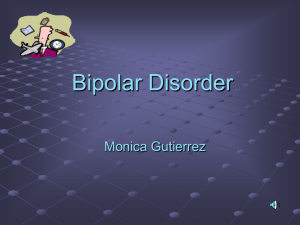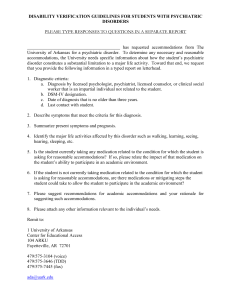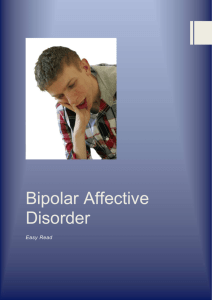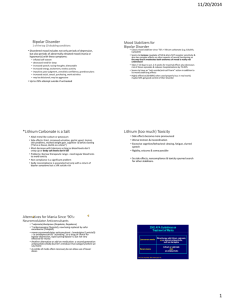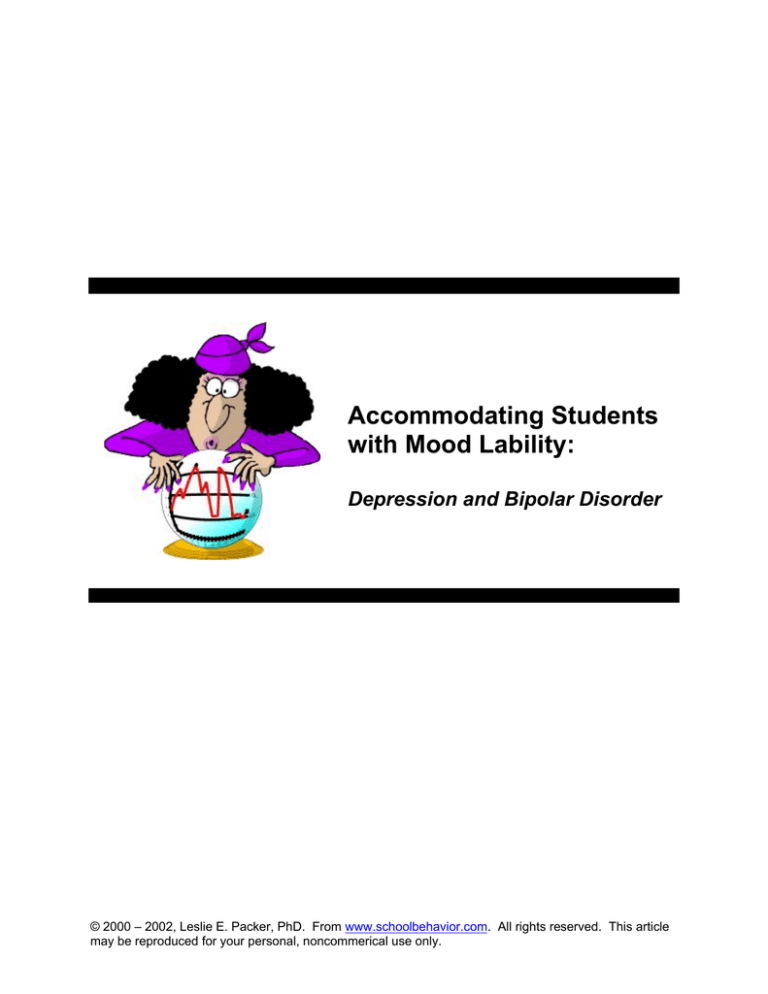
Accommodating Students
with Mood Lability:
Depression and Bipolar Disorder
© 2000 – 2002, Leslie E. Packer, PhD. From www.schoolbehavior.com. All rights reserved. This article
may be reproduced for your personal, noncommerical use only.
The suggestions or ideas that follow assume that the student can be maintained in the mainstream
building. In actuality, some students with severe symptoms may require home instruction, hospitalization,
a self-contained program, day treatment, or residential setting. That said, and while many students with
Bipolar Disorder may need special education, some students may do well with a good 504
(accommodation) plan. As always, one size will not fit all.
Just as there are various subtypes of Attention Deficit Hyperactivity Disorder and not all children with
ADHD will be hyperactive and/or disruptive, there are various subtypes of Bipolar Disorder, and two
students with the same "diagnosis" may look significantly different and have significantly different needs.
A child/teen who is predominantly chronically mixed episode will be challenging, but probably less
variable in presentation over time than a child who has clearly distinct depressive episodes and
hypomanic, manic, or mixed episodes.
For a child who has marked "swings" or distinct episodes, you may essentially need to incorporate a “Plan
A” and “Plan B,” while for a child who is usually an ultra-ultra-rapid cycler or in a more chronic mixed
episode, one plan may cover them for the vast majority of the time.
If you are not clear on what subtype of Bipolar Disorder the
student has, ask the treating mental health professional to clarify
that for you and help you understand what the child's *pattern*
over time is likely to be based on the student's history.
The following are some elements the team may find helpful to consider writing into the plan, keeping in
mind that if the student has associated or comorbid conditions, other elements will need to be added.
Staff Development on Bipolar Disorder1
In the author's opinion, educating the school personnel about Bipolar Disorder is essential. A good staff
development can support the teachers in service of the student by helping the teachers recognize when
they are looking at symptomatic behavior and how not to personalize it. School personnel need to
understand that anger is often symptomatic of depression and that a depressed student who is not
working is not necessarily being defiant, but may be symptomatic. Similarly, school personnel need to
become aware of the changes in mood episodes.
The general description/overview part of the staff development will need to be supplemented by the
parent or treating professional providing some specifics about the child's subtype, what the child will look
like in school, and any medication effects the child may be experiencing.
1
DRADA has a video on teenage depression and Bipolar Disorder that can serve as part of staff
awareness training. See their web site at: http://www.med.jhu.edu/drada/video.html
© 2000 – 2002, Leslie E. Packer, PhD. From www.schoolbehavior.com. All rights reserved. This article
may be reproduced for your personal, noncommerical use only.
If the student suffers from the explosive outbursts known as "rage attacks," the staff development should
specifically incorporate that so that school personnel understand that the student is not really choosing to
have these outbursts and that they (school personnel) can effectively reduce the likelihood of such
problems by making necessary modifications before the fact and when the student is in any "rumbling"
stage.
The staff development may also need to incorporate some discussion of psychotic thoughts/utterances
that some youth with Bipolar may have (e.g., a psychotic depressive episode or hallucinations associated
with mania, etc.). School personnel generally need to be provided specific strategies for how to respond
to such situations, and the student's treating clinician should be asked to provide some advice or
strategies for staff to use.
Accommodations for Medication Side Effects
Students with Bipolar are likely to be on medication, and are often on two or three medications. All of the
medications used to treat Bipolar have potential side effects that are likely to affect the stamina, focus,
and mood in school. As just a few examples of what the student's team might need to consider in
planning for the student:
Students who are on some form of lithium may need the accommodation of keeping a water bottle
with them at all times.
Students who experience diarrhea from their mood stabilizer may need a permanent pass to leave
the room at their discretion, as needed.
Students who are on Risperdal (risperidone) or Zyprexa (olanzapine) may have some cognitive
dulling. Risperdal may also produce significant weight gain and the student may want permission to
have snacks in class.
Some medications may have visual blurring as a side effect and the student may find reading very
frustrating, if not impossible. Reducing the amount of reading, providing a reader, or books on tape
may be necessary.
Some medications will have fatigue or sleepiness as a side effect and the student may have trouble
staying awake in school. See the section below for accommodations for sleep disturbance. Also ask
the student’s prescribing physician whether you should allow the student to sleep in school, and if so,
for how long.
If the student is newly diagnosed, they may go through a number of medication adjustments as they
switch episodes and medications need to be fine-tuned. Parents and physician may need frequent
behavioral or medication-monitoring reports as part of the school's plan.
The student's team (including the parent or guardian) really needs to ask the student how their
medications are affecting them as well as getting the input of the prescribing physician, school personnel,
and the parents. The school nurse is often an integral part of the team for students with Bipolar Disorder
and I would strongly recommend inviting the school nurse to the team meeting. Accommodations for
medication side effects are also discussed in the tips for dealing with side effects file.
Accommodations for Sleep Disturbances
Both depression and hypomania/mania are associated with sleep disturbances. Students who are in a
major depressive episode may be sleeping excessively at home and have tremendous difficulty waking in
the morning. Students who are starting a hypomanic or manic episode may have insomnia and be up all
night.
If the student is experiencing excessive sleepiness, you may need to incorporate accommodations such
as the following:
Allowing the student to arrive at school late.
Shortening the student’s school day.
© 2000 – 2002, Leslie E. Packer, PhD. From www.schoolbehavior.com. All rights reserved. This article
may be reproduced for your personal, noncommerical use only.
Scheduling less demanding academic subjects for the first and second periods of the day.
Testing accommodations that extend time and that allow the student to take the test at a time of day
where they are better able to function.
Providing the student with hard copies of notes they may have missed due to lateness or absence.
Reducing homework and extending deadlines on homework. Many students with depression go
home from school and fall soundly asleep. The amount of time that they’re awake and alert enough
to try to attempt homework is significantly reduced.
You can explore having the student stand up and move around or walk during class or during the
school day to see if that helps him or her overcome the sleepiness.
Keep the student in a brightly lit area and use lots of natural light, if possible – particularly morning
sun. Turning the lights off in the classroom to view a screen makes it too easy to fall back asleep.
Provide resource room assistance as the last period of the day to enable to the student to record and
catch up on anything they missed during the first periods of the day.
Accommodations for Impaired Concentration, Focus, and Memory
Apart from medication side effects, Bipolar Disorder and depression are often associated with significant
problems with concentration and memory. The student is likely to need a number of supports or
accommodations including, but not limited to:
Provision of hard copies of all notes and board work.
Discreet assistance focusing or remaining on-task.
Monitoring to see that all assignments are recorded and materials for assignments are packed. In
many cases, someone on the staff will have to take responsibility for actually recording the
assignments for the student to insure that it's all accurately recorded and packed
An extra set of books to be left at home.
Extended time on homework or projects and/or reduced homework.
Assisting the student by helping them break large projects down into smaller pieces and conferencing
with them on a regular basis to help them stay on schedule.
Word banks or other devices to assist with retrieval of information from memory.
Testing accommodations that include extended time, allowing the student to demonstrate what they
know in alternative ways, use of multiple-choice formats as opposed to open-ended format.
In-school Counseling
Students with significant mood disorders may require in-school counseling on a regular or as-needed
basis. The ability of the student to benefit from in-school counseling varies, as does the skill of the
school's clinical personnel. The in-school counselor (and it should generally be the school psychologist or
social worker and not a guidance counselor) who is seeing the student on a weekly basis will be in an
excellent position to detect any mood swings that might need to be reported to the parents and/or outside
treatment team.
Goals for in-school counseling may address helping the student recognize how their condition is
impacting their ability to deal with academics and peer relationships, developing self-advocacy skills,
developing strategies to work around or manage the impact of their symptoms in school, etc. Goals may
also include having the student seek adult assistance or support when s/he feels that s/he is having
difficulty coping with feelings or frustration or communicating it. In some cases, learning anger
management skills may be part of the school counseling goals.
Gatekeeper
In cases where there is significant mood-related problems and/or frequent changes in medication, it is
helpful to have someone on the student’s team be the liaison/contact for the parents so that information
on the child's changing status or changing medication is quickly disseminated to the teaching and support
© 2000 – 2002, Leslie E. Packer, PhD. From www.schoolbehavior.com. All rights reserved. This article
may be reproduced for your personal, noncommerical use only.
personnel, and so that changes in the student's function are reported to the parents. For some students,
case management will be needed.
Testing Accommodations
Individuals who are depressed may suffer memory problems. Such problems may make it difficult for
the student to quickly retrieve information that they have learned or to retrieve it at all. In addition to
allowing a student extended time on tests, the student may need to be provided with word banks or
multiple-choice formats so that they can demonstrate what they have learned.
For some things, oral examination or alternative testing should be provided so that the student can
demonstrate what they know without having the added burden or demands of written expression
(unless the purpose of the examination is to assess written expressive skills).
If the student is having significant problems focusing, testing in a separate location with a staff
member they feel comfortable with may be a reasonable and necessary accommodation.
If the student is experiencing visual blurring as a side effect of medication, they may need someone
to read the test to them and to ask as a scribe. In other cases, the team may feel that allowing the
student to tape record or dictate answers is a necessary and reasonable accommodation.
For students who have nausea, vomiting, or diarrhea as medication side effects, testing in a separate
location with permission to leave the room as needed will be a necessary and reasonable
accommodation. Testing may also need to be rescheduled for a time of day when the student
generally feels better.
For students who have sleep disturbance, early morning testing is generally inadvisable and the
student may need a later time of day for important tests or state-mandated evaluations.
As much as the author tends to try to avoid going overboard in testing accommodations, given the
variability in the student's stamina, focus, mood, and medication side effects, this is where I think more is
better, but I would write in a certain amount of "at the student's option."
If the student needs the accommodations and refuses them or doesn't recognize that they need them,
that's an issue for the in-school counselor to address.
Permission to Leave the Room
At times, the student may feel that s/he can't cope and needs to get out of the room. Preplanning should
involve the student identifying a "safe place" to go to if they just need to "chill" or a "safe person" that they
can go to. Identifying the place and the person requires the student's involvement as only they will know
where they will feel safe or with whom they will feel safe.
Planning should also incorporate a discreet signal or "graceful exit" so that they can leave without having
to wait to get the teacher's attention and without calling attention to themselves. For young students,
where there might be a safety concern about having them walk in the halls unescorted, other
arrangements need to be made. For most students, providing them with a permanent pass in conjunction
with identifying a safe place and safe person will suffice. When the child needs to leave the room, they
leave something on their desk that signals the teacher that they have gone to the agreed-upon safe place
or safe person.
If a student is so depressed that they have expressed any suicidal ideation, they should not be left without
adult supervision of some kind.
If the student experiences "rage attacks," then in addition to other proactive measures the school
personnel should take, the team will need to have procedures outlined as to what should happen if the
© 2000 – 2002, Leslie E. Packer, PhD. From www.schoolbehavior.com. All rights reserved. This article
may be reproduced for your personal, noncommerical use only.
student gets explosive in the classroom. These procedures are generally incorporated in a Behavior
Intervention Plan.2
Homework Accommodations
Not all students will need homework accommodations, but surveying the parent and student about
homework hassles is an important consideration.
For many of the reasons previously described (sleep disturbance, impaired concentration, memory
problems, visual blurring, nausea, irritability), the student may have significant difficulty in completing
assigned work at home. Indeed, if the parents attempt to push the child to complete the work, the child
might become more depressed or explosive, and the team needs to be sensitive to this.
In some cases, the team may need to eliminate homework altogether during a particular period of time or
arrange for the student to complete the homework during the school day. Scheduling Resource Room as
the first period of the day may enable the student to get caught up on work and become more alert and
functional without the pressure of one of their heavy academic classes.
Behavior/Mood Reporting Charts
Parents and the student's prescribing physician need feedback to guide their interventions and treatment
decisions. For adolescents, part of the case manager's or gatekeeper's job should be to get information
from the student's teachers. The student's team should ask the parent and/or the treating clinician to
provide a simple checklist that school personnel can quickly complete and send or fax home on a
schedule worked out between the physician and school team. If the student is relatively stable on
medications and if the school has already provided a report of their observations to the prescribing
physician, then additional reporting may not be that important. Some provision should be made,
however, so that if the school personnel detect a deterioration in behavior pattern that lasts more than a
few days, they should report it to the parents.
The student's formal written plan should also clearly specify that if the student communicates any suicidal
ideation, the parents or guardian are to be notified immediately, and if they can't be reached, the child's
physician will be called (the parents should be asked to give the district a release that may be kept on file
to call the physician for this purpose).
Behavior Intervention Plan and Modified Discipline
For many students with Bipolar Disorder, a Behavior Intervention Plan (BIP) might be helpful, but
developing an effective plan really requires a more sophisticated understanding of how much the student
is actually able to control on a fairly consistent basis. In the author's opinion, the BIP should probably not
incorporate consequences for the student's behavior as part of the initial plan. The initial plan should
identify the significant accommodations and modifications in the environment, demands, and method of
handling the student that school personnel will make. Once those changes have been implemented, then
the team can look at what behavior is left to deal with and determine if consequences might be effective.
In the author's experience, we have occasionally put a "pilot plan" into place with the understanding that
we would give it 2 weeks and then reconvene to see if we were detecting any immediate improvement
that could be fine-tuned or if we were probably on the wrong track.
The author's reason for not incorporating even positive consequences for the student's behavior at the
outset is that if the student is unable to comply and/or earn those positive consequences, it may
contribute to frustration or depression.
2
Behavioral issues and some comments on behavior modification and behavior intervention plans are
provided in the Behavior section of Tourette Syndrome “Plus” at http://www.tourettesyndrome.net.
© 2000 – 2002, Leslie E. Packer, PhD. From www.schoolbehavior.com. All rights reserved. This article
may be reproduced for your personal, noncommerical use only.
In the beginning, then, the team should focus on environmental modifications, accommodations, changes
in the presentation of academic material, and changes in the work demands and pacing that reduce
stress for the student and enable the student to function in the classroom more effectively.
If the child suffers from "rage attacks," it may be difficult for educators to imagine not incorporating
consequences for the student, but there is little empirical support for the notion that applying
consequences to rage attacks does anything productive, and clinical experience suggests that changing
the environment and teaching educators interventions that they can use to prevent and defuse situations
is much more likely to be successful at reducing or eliminating the problem.
In some cases, allowing the student to go for a walk when they’re close to losing control may help them
restore themselves to better self-control. For other students, using their muscles to do heavy lifting or
digging or making large arm movements (such as washing a blackboard in big sweeping movements)
may help dissipate some of the increased tension or irritability.
In the author's experience, there have been many times when schools took the position that they had to
suspend a student or take other firm measures because of district policy and/or because it would set a
terrible example for other students. Using a short (one-day) out-of-school suspension for seriously
aggressive behavior may be of benefit to some students with Bipolar Disorder, but it may make other
students feel more demoralized or angry. I see no value to longer suspensions unless the student is
undergoing medication changes (in which case the parent might voluntarily choose to keep the child
home for a while as you would with any medical problem), or unless the team is using that time to create
a new program for the student.
If a student is suspended out-of-school for disability-related behavior, then in addition to other steps
mandated by I.D.E.A., I would strongly encourage the team to consider allowing the child to come into the
building to receive counseling so that they can discuss how they are going to avoid a repetition of what
happened.
Additional Evaluations Needed?
As noted earlier, some children with Bipolar Disorder will experience various kinds of memory problems or
attentional difficulties. Whether the problems are due to interference from depression, flights of thought,
or medication side effects isn't always clear without additional evaluation. For some students, then,
neuropsychological evaluation may be important and may suggest the need for other accommodations or
related services.
Another area of functioning that school personnel may need to reconsider is whether the student has the
communication skills to communicate when they are frustrated or depressed. A speech-language
evaluation that looks at such skills may lead to speech as a related service to teach the student a
vocabulary of emotion and to work with the student on the pragmatics of communication.
Academic Scheduling
Medications for mood disorders tend to be long-lasting; teachers shouldn’t expect to see the kind of kickin and rebound effect problems that are common with Ritalin or other medications, but there are still likely
to be times of day that are better or worse for the child. Students who experience significant problems in
the morning due to sleep disorder may need their "heavy" academic courses a bit later in the day when
they're more alert. Similarly, those who have a seasonal (winter) component to their depression may find
that their mood improves (and with it, their ability to concentrate and function) as the day goes on. Ask the
parent and student what the student's pattern is in terms of feeling in a better mood, ability to concentrate,
etc.
© 2000 – 2002, Leslie E. Packer, PhD. From www.schoolbehavior.com. All rights reserved. This article
may be reproduced for your personal, noncommerical use only.
For students who experience significant difficulty in the morning, the team may wish to consider options
such as: (1) scheduling an interesting course that the student really enjoys for 1st period, (2) allowing the
student to start the day later, and (3) assigning the student to Resource Room for 1st period.
Preferential Seating
Some students may need to sit closer to the teacher to enhance their ability to focus and to enable the
teacher to discreetly assist them in refocusing or initiating tasks. Other students may wish to sit nearer to
the door so that they can leave without calling attention to themselves. The student should be allowed to
decide where to sit. If space is not a problem, perhaps the student can vary where they sit, depending on
their needs at the time.
Remediation and Accommodations for any LD
A child who is already burdened with coping with a mood disorder may not be able to tolerate the
frustration of even mild LD. Thus, even if the student doesn't "fit" the criteria for being considered
Learning-Disabled, be sure to address any LD's that may be contributing to frustration, irritability, and/or
depression.
Resource Room
Resource Room may be an important component of planning for students with Bipolar. It gives them a
specific time when they can get extra help or organize themselves if they're having a bad day, and it gives
them a smaller group and reduces stimulation for that period. Using Resource Room in 1st period may
work very well for those students who have trouble with early morning functioning or who are being
transitioned back into school following hospitalization, home instruction, or day treatment, as it gives them
a more "gentle" way to start their school day. Other students may want Resource Room toward the end of
the day when they are more likely to experience difficulty keeping themselves together or if they're so
disorganized that they are likely to go home without assignments and materials.
Added Adult Supervision
Some students may require added adult supervision when they are in particular episodes so that they
have extra support for transitions, peer interactions, and/or getting started on tasks or staying focused on
them. Do not neglect to consider the need for added adult supervision in cafeteria, on the bus, and at
recess for students who might be explosive or easily provoked.
For students who seem to be constantly getting into trouble because of their symptoms, assigning a 1:1
paraprofessional may be necessary, but that paraprofessional will need adequate training on the
student’s condition and how to work effectively with the student.
Referral to Mental Health or Other Agencies
Bipolar Disorder is a serious condition, even in its mild form. For the school to be able to educate the
child, other supports may need to be in place. The school district can assist in arranging for referrals to
mental health services for the student, family therapy (if necessary), and parent counseling/education.
Adolescents with Bipolar Disorder who have developed substance abuse problems may also need
referrals to the appropriate supports for that problem.
© 2000 – 2002, Leslie E. Packer, PhD. From www.schoolbehavior.com. All rights reserved. This article
may be reproduced for your personal, noncommerical use only.
Peer Education
In the author's experience, one of the hardest parts about depression is the reactions of peers who may
say things like, "Snap out of it!" or "Stop feeling sorry for yourself!" or "You could do it if you want to."
Educating students about depression and Bipolar will not only help the student who is suffering from it but
will also help other students recognize when they might need help or when a peer or family member
might be at serious risk of suicide. The video from DRADA can be used as part of peer education as well
as staff development.
Parent Counseling
Some parents are well-educated about their child’s condition(s) and will be able to help educate the
school team. In other cases, parents need training from school personnel so that they can learn what to
do in the home to support the school’s efforts. This may entail teaching the parent how to structure the
student in terms of homework, providing the parent with information on how to establish good sleep
habits, or working with the parent to establish an appropriate level of responsibility for the child in the
home, as just some examples.
Empower that Student!
One of the things all of us want is to empower the student, but we don't always thing to actively involve
the student in their own planning when they seem seriously depressed or "off."
When a student has depression or Bipolar Disorder, inviting them to the planning meeting (even if it's not
for the whole meeting) to help determine what supports they need may be therapeutic for the student as
well as helpful to the team in terms of creating a plan that is more likely to be successful.
If the student is hypomanic or irritable, their contribution to the meeting may make the meeting more
difficult for a while, but it is important for them to know that someone is hearing them, and getting a sense
of the child's irritability will be helpful to those who don't have frequent contact with the student.
© 2000 – 2002, Leslie E. Packer, PhD. From www.schoolbehavior.com. All rights reserved. This article
may be reproduced for your personal, noncommerical use only.

